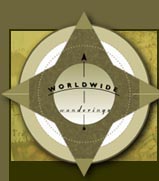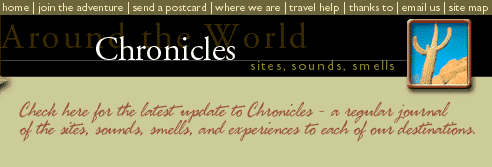Sept. 20-24, 1998 Stockholm, SwedenAfter
6 hours on the train, we step down onto the platform feeling a little stiff. Apparently,
our legs had grown rather comfortable during the long ride and were now holding a protest
of sorts when asked to carry not only our usual weight, but also that of our packs. Our
first stop, as usual, was the ATM to withdraw the next few days ‘allowance’, and
then to change window to exchange any leftover cash from the last city (as a rule, a mere
pittance).
Following the signs lead us into the main part of the local subway station –
during rush hour. If you live in, or have had occasion to visit a big city, you have seen
and probably navigated what I call a ‘human river’. As a rule, this phenomenon
occurs when a large number of people, all rushing towards their various destinations, are
forced into a bottleneck – a space more narrow than the combined width of the bodies
trying to squeeze through it. In short, this causes an almost solid, rapidly moving, mass
of humanity split roughly down the middle, half flowing one way, half the other.
We stand at one side of the wide corridor, backpack adding considerable weight to an
already wobbly set of stilts (our legs). At the other side, the ATM, change window, and
subway information window. I look at Laura. Ready. Go! We gradually join the stream,
making our way towards the middle with each step. Then the critical move – the turn.
A half twist and the river turns us the rest of the way. Back in the opposite direction. A
few more steps help make our way towards the far wall. And we’ve made it! A fine
welcome to Stockholm during Monday rush hour.
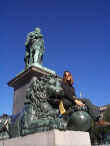 Stockholm
is by far Scandinavia’s largest city. It’s 1.4 million inhabitants live in a
thriving, water-bounded metropolis. This large but welcoming city is, in fact, made up of
14 islands connected with 53 bridges. The water does much to enhance the charm of the
city, as do the numerous parks and public gathering spots. Demonstrating that it is very
much a city of contrasts, within our first 10 minutes of strolling, the city offered us
everything from a large group of loud (and obviously disgruntled) protesters outside the
Central Station, to a small group of middle-aged men in the park with barely a care in the
world with the possible exception of where the next toss of their Bacci ball landed.
Stockholm
is by far Scandinavia’s largest city. It’s 1.4 million inhabitants live in a
thriving, water-bounded metropolis. This large but welcoming city is, in fact, made up of
14 islands connected with 53 bridges. The water does much to enhance the charm of the
city, as do the numerous parks and public gathering spots. Demonstrating that it is very
much a city of contrasts, within our first 10 minutes of strolling, the city offered us
everything from a large group of loud (and obviously disgruntled) protesters outside the
Central Station, to a small group of middle-aged men in the park with barely a care in the
world with the possible exception of where the next toss of their Bacci ball landed.
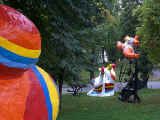 The
city’s year-long cultural festival (as the Cultural Capital of Europe this year)
boasted a choice of selection ranging from Small Dutch Masters, to modern conceptual
sculpture, with an impressive assortment of everything in between. Our days here were
short, and seemed to blend together. So much to do and see, with so little time.
The
city’s year-long cultural festival (as the Cultural Capital of Europe this year)
boasted a choice of selection ranging from Small Dutch Masters, to modern conceptual
sculpture, with an impressive assortment of everything in between. Our days here were
short, and seemed to blend together. So much to do and see, with so little time.
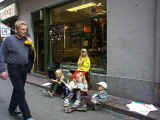 The majority of our time was spent in and around Stadsholmen, or the Old
Town. As it was centuries earlier, its narrow canyons of streets intersect with one
another as they cut their way through tall buildings, just barely letting the sun in.
Shop, shop, till you drop. But make sure that when you do drop, it is into one of the
city’s many old and authentic Swedish restaurants.
The majority of our time was spent in and around Stadsholmen, or the Old
Town. As it was centuries earlier, its narrow canyons of streets intersect with one
another as they cut their way through tall buildings, just barely letting the sun in.
Shop, shop, till you drop. But make sure that when you do drop, it is into one of the
city’s many old and authentic Swedish restaurants.
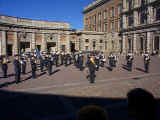 After lunch, we hurried over to witness the pomp and circumstance of the
changing of the guard ceremony at the Royal Palace. The 608 room palace is the largest one
in Europe that is still being used as such. The King and Queen arrive almost every working
day to busily do whatever it is that Kings and Queens do all day.
After lunch, we hurried over to witness the pomp and circumstance of the
changing of the guard ceremony at the Royal Palace. The 608 room palace is the largest one
in Europe that is still being used as such. The King and Queen arrive almost every working
day to busily do whatever it is that Kings and Queens do all day.
Following the hour long ceremony, we headed back across the bridge and onto the waiting
canal boat for a quick tour of the city by water. Although rather educational, the weather
had turned overcast, and our ability to enjoy and photograph many of the sights along the
way was diminished. One of the few highlights of the tour was when I, during one the of
the many periods of music without commentary, quickly reached over and switched
Laura’s headphone from channel 2 (English) to channel 1 (Swedish). The look of
confusion on her face as the next voice segment started was well worth the short sting of
a smack on the arm once she had figured out what I had done.
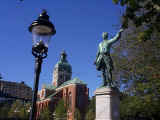 The
following day brought bright, warm, sunshine. According to our host, it was one of the
first few days without rain that they had enjoyed over the last few months. Laura and I
hopped on a ferry and made our way across the harbor to the island of Djurgarden. Once the
king’s hunting ground, it is now home to some of Stockholm’s best sights
including Skansen (a sort of Swedish Colonial Williamsburg), Nordiska Museum,
Waldemarsuddle (former palace of the artist prince, Prince Eugen), and our personal
favorite, the Vasa Museum. The Swede’s have raised and completely restored the
largest and most expensive of ship of the King’s Navy. On its maiden voyage in August
of 1628, this 64 cannon man-o’-war was 20 minutes into it voyage when it was hit by a
sudden gust of wind with its bottom gun ports open. On her side, she quickly took on water
and sank. We found the Vasa itself, as well as the $35 million dollar museum built
around it, to be awe-inspiringly huge and well worth a visit.
The
following day brought bright, warm, sunshine. According to our host, it was one of the
first few days without rain that they had enjoyed over the last few months. Laura and I
hopped on a ferry and made our way across the harbor to the island of Djurgarden. Once the
king’s hunting ground, it is now home to some of Stockholm’s best sights
including Skansen (a sort of Swedish Colonial Williamsburg), Nordiska Museum,
Waldemarsuddle (former palace of the artist prince, Prince Eugen), and our personal
favorite, the Vasa Museum. The Swede’s have raised and completely restored the
largest and most expensive of ship of the King’s Navy. On its maiden voyage in August
of 1628, this 64 cannon man-o’-war was 20 minutes into it voyage when it was hit by a
sudden gust of wind with its bottom gun ports open. On her side, she quickly took on water
and sank. We found the Vasa itself, as well as the $35 million dollar museum built
around it, to be awe-inspiringly huge and well worth a visit.
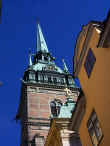 I’d like to revisit this city someday. Maybe
during the summer months with more time on my hands and money in my pocket.
I’d like to revisit this city someday. Maybe
during the summer months with more time on my hands and money in my pocket.
As a side note, I learned that the Swedes have made quite a contribution
to our modern society. Below is a short list of things for which we owe our indebtedness.
Made in Sweden:
| Ingmar Bergman Absolute Vodka
Alfred Nobel (Nobel Prize)
ASTRA
Bjorn Borg
Electrolux
Ericsson
The zipper
Gretta Garbo
Ikea
Ingrid Bergman
The safety match |
Ingo Johansson Saab
Smorgasbord
Stephan Edberg
The adjustable wrench
Volvo
August Stindberg
The propeller
Tetra pak
Dynamite
Abba
Ingemar Stenmark |
|
|
